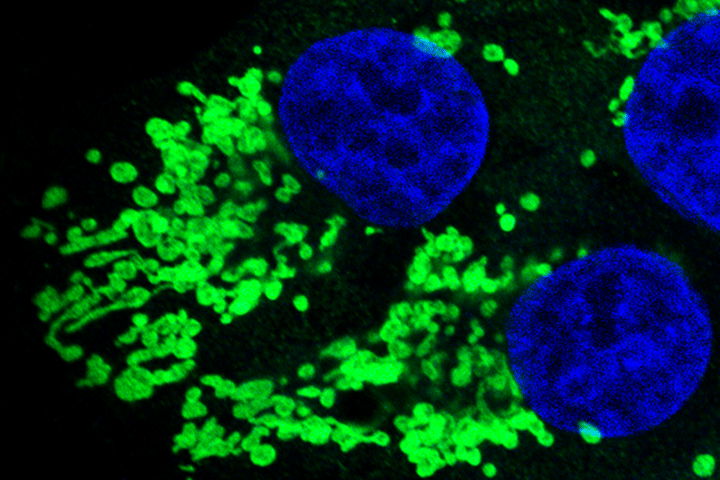A Look at MEK and Autophagy Inhibition

One of the major goals of translational research is to quickly bring findings from discovery science to the patient in the form of more effective treatments.
How long that effort takes depends on many factors. Some estimates show that it takes about 10 years and about $1 billion for a lab discovery to become a drug approved for human use. Why? Clinical trials can be challenging—what seemed so exciting in pre-clinical work just doesn’t work the same in the human body. Or maybe drugs that seemed promising in early phase clinical trials didn’t pan out in terms of safety, toxicity, and efficacy when they reached later-stage trials. Sometimes, the lab-to-trial process moves a lot faster.
Researchers in the lab of physician–scientist Conan Kinsey, M.D., Ph.D. of the University of Utah Huntsman Cancer Institute (Salt Lake City) are focused on combining so-called targeted therapies with inhibition of a cellular process called autophagy in pancreatic and gastrointestinal cancers. One target of particular interest is MEK1 and MEK2 proteins within the cancer cell. MEK1 and MEK2 are part of a pathway called MAPK, which is directed by the notoriously difficult-to-target protein called KRAS, found in about 90 percent of pancreas cancers. The lab’s goal: to rapidly translate the findings to patients.
Research Updates
In 2019, Kinsey and colleagues began a phase I trial called THREAD. In this trial, researchers looked at the safety and tolerability of increasing doses of a drug called hydroxychloroquine (HCQ) in combination with a fixed dose (stays the same) of another drug called trametinib in patients with metastatic or locally advanced, unresectable pancreatic ductal adenocarcinoma. The trial moved from the lab to patients in about 20 months, which is extraordinarily fast. Trametinib is an MEK inhibitor that acts on the KRAS pathway, which in turn increases autophagy as a resistance mechanism. HCQ inhibits autophagy, causing a cytotoxic effect.
A separate study from the THREAD trial, presented in early 2020, looked at 12 metastatic pancreatic cancer patients who had received many other treatments and had exhausted standard-of-care options. These patients received treatment with the combination of trametinib plus HCQ; eight of these patients received the treatment for more than 30 days. The progression-free survival time for patients who received treatment for more than 30 days was 2.9 months, and the overall survival time was 7.4 months (since start of treatment). Of seven evaluable patients, one patient had a partial response, three patients had stable disease (for at least eight weeks), and three progressed while on the treatment.
“Phase I of the THREAD trial has now also concluded and what we’re doing next is looking at an expanded safety and efficacy cohort across a broader population,” says Kinsey. “What we know is there are some people who respond really well to this regimen and others who simply don’t, so we need to find biomarkers which predict which patients will respond, which we are actively pursuing.”
Kinsey is also involved in a basket trial for gastrointestinal malignancies called UTAH. This trial is examining a drug called ulixertinib (BVD-523) as a novel targeted cancer treatment in cohorts of patients with specific genetic alterations that result in aberrant MAPK pathway signaling. It will be used in combination with HCQ. There is also an expanded access program providing ulixertinib for compassionate use in advanced cancer patients with MAPK pathway-altered solid tumors, including but not limited to KRAS, NRAS, HRAS, BRAF, MEK, and ERK mutations, who have incomplete response to or have exhausted available therapies. “We are interested in investigating whether this combination therapy may work for many RAS/RAF mutated cancers beyond pancreatic cancer, and this is the first step, by finding a safe and tolerable dose for patients,” Kinsey explains.
A Possible Triple-Therapy Approach
One particular area of interest for Kinsey and his colleagues, as well as researchers across the country, is how best to make immunotherapy a reality for more pancreatic cancer patients. Although immunotherapy has been used quite successfully in several other cancers, pancreatic cancer has proven itself to be a formidable challenge in this space. “Pancreatic cancer patients haven’t yet benefitted from the revolution in cancer immunotherapy mostly because of the dominantly immunosuppressive tumor microenvironment of pancreatic cancer,” Kinsey notes. But what they do know is that drugs causing MEK inhibition combined with agents causing autophagy inhibition can lead to tumor responses.
There is a lot of interest in using checkpoint inhibitors, a type of immunotherapy that works by blocking checkpoint proteins from binding with their partner proteins. This prevents the “off” signal from being sent, allowing the body’s natural cancer fighters called T cells to kill malignant cells. Two such checkpoints under investigation are called PD-1 and CD40. “There is a lot of research going on looking at anti-PD-1 and CD40 stimulating antibodies because essentially the baseline immune response against a pancreatic cancer tumor is insufficient; basically it’s what we call a ‘cold’ tumor and we want to make it ‘hot’,” says Kinsey.
Researchers are looking at combining PD-1 inhibitors and/or CD40 activators with agents that cause co-inhibition of MEK and autophagy. This type of triple or quadruple therapy may lead to enhanced anti-tumor immunity, he adds.
In a recent paper called “Challenges and Opportunities for Pancreatic Cancer Immunotherapy,” published in Cancer Cell, researchers looked at novel immunotherapy strategies currently under investigation to confer antigen specificity, enhance T cell effector function, and neutralize immunosuppressive elements within the tumor microenvironment “that may be rationally combined to untangle the web of immune resistance in” pancreatic cancer and other tumors. “The paper came out of U Penn and what Bob (Vonderheide) and Mark (O’Hara) and others say at the end that ‘one day’ targeted therapies that block KRAS signaling like MEK inhibitors or autophagy already are already here,” says Kinsey. “We have the drugs, and as we look at this more closely we may find they work in concert with an immunotherapy approach like a checkpoint inhibitor.
“I’m very hopeful that we will find a way to make immunotherapy more effective for pancreas cancer patients.”
He is also hopeful about 2021. “At the beginning, in March, our lab was probably running at about 60 percent because of the pandemic,” Kinsey explains. “Then we moved to about 80 percent during the summer of 2020 and by the end of the year we were back up to 100 percent. Last year was challenging in a lot of ways, but it’s not like research ever came to a complete halt. We’re physicians and scientists and we always want to find a way to keep things moving in a positive direction for our patients today and our patients in the future.
“We are getting closer to understanding pancreatic cancer; I don’t believe there is ever going to be one drug that is going to extend life or maybe even cure it. Rather, it’s going to be a combination approach that is going to make a difference, and I do believe we will get there.”





